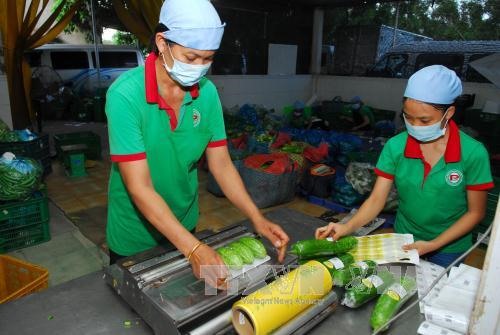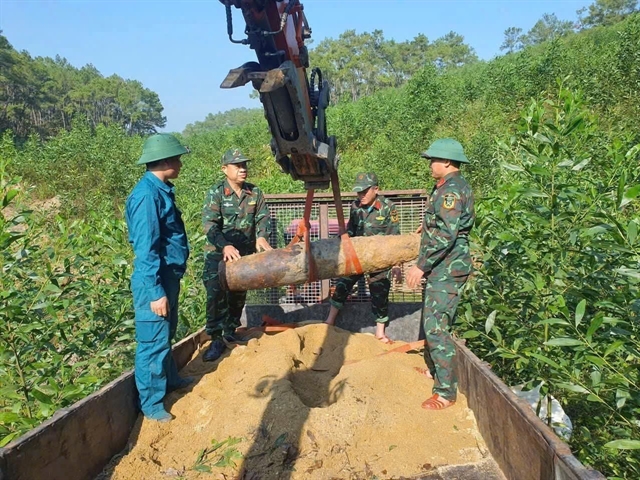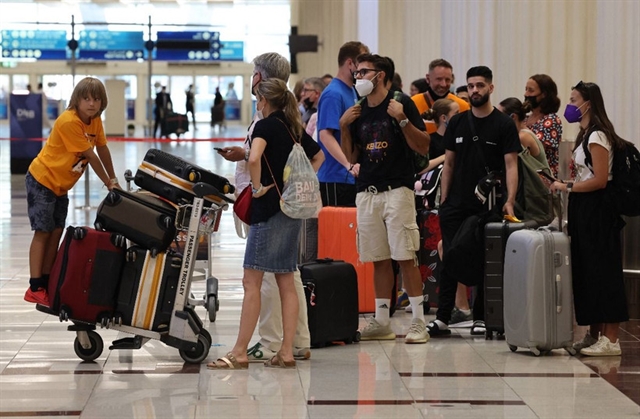 Society
Society

" />HCM City plans to strengthen links with provinces that supply it farm produce to improve oversight at their points of origin, officials said.
 |
| Vegetables get electronic traceability stamps affixed at Phú Lộc Co-operative in HCM City’s Bình Chánh District. – VNA/VNS Photo Mạnh Linh |
HCM CITY— HCM City plans to strengthen links with provinces supplying farm produce to improve oversight at the points of origin, officials said.
The city’s own agricultural output meets only 20-30 per cent of demand and the rest is supplied by other cities and provinces, according to Nguyễn Thị Nhã Trúc, head of the Food Safety Management Board’s quality management office.
Therefore, the city faces a huge challenge in supervising, managing and tracing the origins of agricultural, forestry and fishery produce.
The city had various programmes to safeguard consumers’ health and benefits, which have been reasonably successful, she told a conference on food safety management in HCM City yesterday.
A programme to trace the origin of pork started last December allows consumers use their smart phones to check product information on farming facilities, abattoirs, producers, distributors, and retailers.
The programme, carried out by the city Department of Industry and Trade, has signed up 1,130 farms that supply more than 10,000 pigs a day and 25 abattoirs in HCM City and other cities and provinces.
Hóc Môn and Bình Điền wholesale markets, 23 traditional markets and all modern distribution systems such as supermarkets and convenience stores are taking part.
In January the Department of Agriculture and Rural Development began a pilot programme to trace the origin of vegetables using QR code scanning apps in phones.
Two participants, Phước An Co-operative in Củ Chi District and Phú Lộc Co-operative in Bình Chánh District, supply 8-8.5 tonnes of vegetables and fruits daily with electronic stamps with information on their packaging.
Since 2013 a programme has been building up a safe supply chain from breeding, slaughter and transport to processing and distribution.
A total of 45 food producers and trading establishments are certified as ‘safe’ for farm produce like vegetables, seafood and poultry eggs.
The city is set to sign agreements with provinces to develop the safe supply chain further in terms of quantity and variety of products.
Abuse of chemicals
“The excessive use of plant protection chemicals and antibiotics in agricultural production has yet to be brought under control, causing great health concern,” Trúc said.
As most food producing and processing facilities in the city are small-scale, they had not fully complied with food safety requirements, she added.
Nguyễn Thị Dân An, head of the health office under the Bình Chánh District People’s Committee, said local authorities regularly inspect and support these facilities to ensure they improve food safety practices.
But she admitted that the lack of severe penalties and lax enforcement are barriers to reducing violations related to food safety.
Enterprises need to be aware of their responsibility to produce safe products, she said.
Lê Trường Giang, chairman of the city Public Health Association, said the production and trading of chemicals and food additives are not well managed, especially at Kim Biên market, and many with dubious origins are used as a result.
Authorities do not impose large enough fines on production and trading facilities which fail to prove the origin of their raw materials and products, he said.
Nguyễn Nguyên Phương, head of the Department of Industry and Trade’s commercial office, said efficient management of agricultural supplies from other provinces at three wholesale markets, Thủ Đức, Hóc Môn and Bình Điền, and supermarkets means 95 per cent of agricultural products consumed in the city "is controlled".
He suggested that products of unknown origins and without clear records should be prohibited at wholesale markets.
“Only severe punishment will help ensure the safety of products in the market.”
A shortage of human resources prevents frequent inspections and other actions to keep out unsafe food products, he admitted. —VNS




